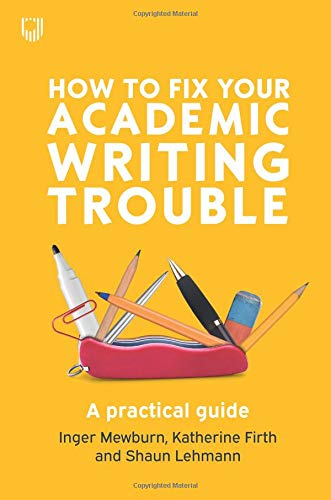An excellent new book on fixing academic writing problems
Inger Mewburn, Katherine Firth and Shaun Lehmann,
How to Fix Your Academic Writing Trouble:
A Practical Guide
London/New York: Open University Press, 2018
ISBN 978-0-3352-4332-7
xi + 163 pages; £23.99 (paperback) £20.51 (Kindle edition)
This outstanding short book will be of immense value to research students and their supervisors. The authors aim to address common issues which PhD students face in writing their thesis, and provide practical advice on how to tackle those issues. All three authors are experienced in advising and helping research students to write at universities in Australia, and their academic expertise ranges across STEM (science, technology, engineering and maths) and HASS (humanities and social sciences) subjects. I’ve been reading the excellent blogs which Mewburn and Firth contribute to, The Thesis Whisperer and Research Degree Insiders, for some time now, and a good deal of the material in this very practical book has developed from posts on that blog.
After an introductory chapter setting out what the book aims to do, and sketching some valuable techniques to ‘time manage’ academic writing, each chapter is focused around a comment which a supervisor might make on writing from a doctoral student: your writing doesn’t sound very academic; where’s your evidence for this?; your writing doesn’t flow; waffle!; uncritical!; where’s your discussion section? (the latter is on the shaping of a whole research thesis). There’s a valuable bibliography and a useful topical index.
The book gives a very good sense of what kind of writing a doctoral thesis is, and ‘inducts’ readers into the nature of the community and conversations of academics and writers which they aspire to join. I loved the image of a slightly uptight, polite middle-class dinner party as the nature of an academic conversation, a thread which runs through a number of chapters.
The writing throughout is clear, lucid and engaging, with well-chosen examples, helpful metaphors, good acrostics to remember, and useful tasks to try out on your own writing to achieve the improvement that is required. For example, the section on choosing verbs to show that you ‘belong’ to the academic conversation (§2.5) includes a ‘verb cheat sheet’ (p 27) of verbs which sound awesome, neutral or poor in academic writing. There’s a valuable table of how to use conjunctive adverbs correctly, so that your reader will know the direction your argument is now taking (p 51). There’s a very helpful process for producing an abstract (§7.4), to which I shall now regularly point my students when they’re ready to do that. There’s helpful advice on cutting down on excessive words (§5.5)—in my experience a regular need for students working in Theology and Biblical Studies. There’s good advice on when to footnote (§2.8). These are just a few examples: every main chapter has lots of these practical ways of tackling issues and tasks, and I shall now regularly point my students to relevant chapters or sections.
I warmly commend this book—supervisors will want to read the whole thing (and it won’t take long) so that they know where relevant sections are for their students. Students will probably want to dip into sections in working on different aspects of their writing. Get your library to get this, and have a copy on your own shelf too—it’s doing something which no other book I can think of does so helpfully or effectively.


Thanks for this informative review Steve. It looks like an excellent resource. Otago University has it on order, so I will be checking it out soon!